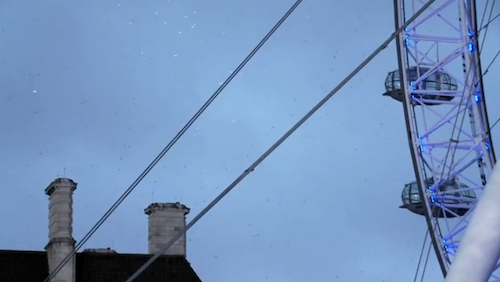Who: Casagrande, over 300 poets from 204 countries
What: Rain of Poems, London 2012
When: Tuesday, 26 June 2012, 9 PM
Where: Jubilee Gardens, Southbank Centre, London
“Open Door” features audio, video, and online media to document dynamic interactions between poetry and its audience. “Open Door” showcases performance, scholarship, and engagement outside the usual boundaries of slams, workshops, and book publications. This week: the Rain of Poems in London.
[Editor's Note As we get ramped up for the start of the Olympics on Friday, we're taking a look back at last month's Poetry Parnassus. David Shook was on-hand at the Parnassus and will be publishing his dispatches this week. To start, we look at the Rain of Poems.]
***

The Rain of Poems was the most publicly anticipated event of the Poetry Parnassus (The Guardian: "London prepares for poetry bombing"), A.K.A. The Simon Armitage Brain Trust, a Southbank Centre-organized mega-collaboration that assembled as many of the 204 representative poets from their Olympic nations as possible in a noncompetitive space for collaboration and friendship. The Rain symbolized the Southbank Centre's and their many partners' Parnassian efforts at finding and loosely organizing poets from all 204 Olympic nations. The Chilean poetry-and-arts collective Casagrande, who were in attendance at the Parnassus in addition to Chilean poet Alejandra del Río, took a page from Raúl Zurita's book: the sky.
The collective dropped 100,000 specially designed bookmarks from a helicopter, featuring the work of over 300 poets, each poem appearing in English and Spanish, many of them translated from languages as diverse as Burmese, Gun, and French. Casagrande had already dropped poems over five cities—Santiago, Dubrovnik, Guernica, Warsaw, and Berlin, each one having been at some time bombed during military confrontations, and featuring poems by Chileans and their host nation's poets.
At first I didn't get it. I laughed about it with my friend Recaredo Silebo Boturu, the Parnassus' poet for Equatorial Guinea, whose work I translated for the Rain, and who was unable to be there in person. It seemed like excess, like self-agrandizement, gimmicky. I discussed these things while I walked toward the Jubilee Gardens, under the London Eye and within sight of the Thames, with Sudanese poet Al-Saddiq Al-Raddi, who would almost certainly be in jail if he were at home in Khartoum now, along with the majority of his journalist colleagues. Still, the idea seemed if overwrought at least entertaining, and we walked excitedly toward the sunset drop.
The helicopter appeared from the South about five after 9 PM, and dropped a couple thousand poems to test the wind. It was impossible to tell how many they had dropped, really, because they fluttered and spun and moved in schools like fish. They were nowhere near us, nowhere near any of the thousands of assembled spectators.Was that it? It looked like a lot of poems, but surely they couldn't have so epically failed. The helicopter moved Northwest to the edge of the Thames. It looked a lot further away than I expected. But the recalibration worked. Poems were falling in bursts of several thousand. And then, to my surprise, the Rain of Poems combined the concepts of poetry and riot better than any event I have ever attended.
Nothing was caught on fire, no rubber bullets were necessary. It was like a poetry riot should be. It was beautiful. People were chasing poems across the park. Hundreds of people were chasing them, from thirty feet onward, latching on to bookmarks with their eyes and speedwalking, often at each other, jumping toward the poems as they came within reach. The space was filled with people who had read about the bombing in the paper and people who just happened to be in the area. I couldn't catch a poem for at least fifteen minutes, because they were still coming down sparingly, in bursts, but I eventually got Marshall Islands poet Kathy Jetnil-Kijiner's "History Project," which ends with a fitting image: "we mistook radioactive fallout/for snow." Several poets had become quite competitive about snagging poems, but it was difficult to compete with the teenagers. I saw one run into an elderly woman's head with his arm, to victoriously catch a falling poem. It was a spectacle. Tishani Doshi, in a sari, lost her collaborator, composer Max Ablitzer. Al-Saddiq Al-Radi grew restless and smoked cigarettes over the Thames. Two construction workers drinking pints, squatting against a short wall, watched over everything. "I wonder how much this cost," one said.
Later, there were stories. My wife caught a poem walking out of Waterloo Station, a half-mile away. Poets had caught their own poems. My friend Sarah Maguire had caught a poem she translated, Afghani poet Reza Mohammadi's "Rain." A friend of Nikola Madrizov—who has his own moving story—had had a poem flutter into her lap, while riding her bicycle the next day, about a mile from where the poems had fallen, from some building or tree.
Two days later, at a musical performance by the Casagrande band, collective members Fernando and Julio screened a film they had made of the event, which they've graciously provided above. I asked Julio about the difficulty of setting up such a large-scale operation, which he downplayed. He said that the City of London had been very enthusiastic about the project. Unfortunately things don't look like they'll be as simple in Hiroshima, where Casagrande had hoped to stage their final Rain of Poems.
***
David Shook was the Translator in Residence of the Poetry Parnassus, which convened poets from all 204 Olympic nations in London in late June 2012. At the Parnassus he premiered Kilometer Zero, his illicitly-filmed movie about Guinean poet Marcelo Ensema Nsang. His new chapbook Crooked Books is available from Whitehorse & Slaughter.
(If you would like to pitch an “Open Door” feature concept, please email [email protected] with “Open Door” in the subject line.)
Poet, translator, and filmmaker Shook was raised in Mexico City. They earned a BA at the University...


